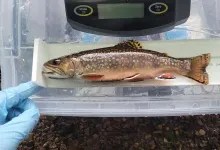(Press-News.org) LAWRENCE — We have all avoided having conversations if the topic is controversial or may lead to an argument. Farmers, who are on the front lines of climate change, avoid talking about it with their neighbors, community members, elected officials and even their own families because of potential conflict and harm to their livelihood, new research from the University of Kansas has found.
Researchers conducted interviews with more than 20 farmers in Kansas and Missouri to understand their communication about climate change. Results showed respondents had a range of views on climate change from being convinced of its effects and taking action in their farming operations to skepticism — but all avoided discussing it to varying extents.
“People were worried about a variety of reactions. Some said they couldn’t even talk about it with their families because they would give them a weird look if they brought it up,” said Hong Tien Vu, associate professor of journalism & mass communications at KU and lead author of the study. “That was a low-level worry, but others said they had heard people laughing at them or were concerned about their neighbors not working with them if they had different opinions.”
The study was born from research Vu and students started during the COVID-19 pandemic. The group received private donor funding to study local climate change effects. Students interviewed scientists on campus and farmers in surrounding communities about climate change, their views on it and how it affects them. Farmers were reluctant to discuss the topic on camera.
“When we talk about climate change, we tend to look at broad effects like sea level rise. It can be difficult for people to find relevance in topics like that in their lives. We wanted to focus on factors that relate to people’s lives here in Kansas,” Vu said. “We wanted to interview farmers specifically because they are on the front lines of climate change impacts, both in terms of contributing to it through factors like emissions and feeling the effects of it.”
Given farmers’ reluctance to discuss the topic on camera, researchers decided to conduct interviews in which they could guarantee anonymity for respondents. Farmers then discussed their opinions on the topic, how it affects their lives and work, and why they avoid discussing it.
The researchers examined the topic through the lens of spiral of silence theory, which posits that when discussing controversial topics, people judge the prevailing opinion of others before deciding whether to speak. If they feel they are in the minority, people will often choose not to discuss a topic, which can have long-term ramifications, including silencing people and exacerbating problems that people choose not to address.
The results confirmed the prevalence of a spiral of silence among Kansas and Missouri farmers. The respondents were both men and women, ranging in age from their 20s to 70s. When asked their thoughts on climate change, responses ranged from believing it is real, scientifically proven and having effects now, to being skeptical both of its prevalence and whether it is caused by humans. But across the board, respondents indicated they generally avoid discussing the topic.
The farmers gave a range of reasons why they avoid it. Many simply did not want a conflict that could result in violence or an argument with neighbors or community members. Some feared it could damage their business, as neighbors might be less likely to work with them and share equipment or people might give them a negative online review and tell people not to buy their products at farmers' markets and other locales if they disagreed with their views.
Farmers said they also tried to gauge a person’s opinions based on interpersonal cues before deciding whether to discuss climate change. For example, the type of vehicle a person drives, whether a large pickup or hybrid car, can provide clues about their opinions on the matter.
Spiral of silence theory holds that people traditionally used news media to gauge political opinion on a potentially controversial topic. However, respondents in the study indicated they felt news media only politicized the topic and therefore was not a trustworthy way of determining how people felt. Instead, many turned to social media where they could see if people posted on the topic or to find others to discuss it with, without fear of arguments or contentious conversations.
“The algorithm can allow you to choose who to talk to or who to exclude,” Vu said of social media. “People also often feel masked on social media. To me, that is a way of losing conversations and can give you a false sense of prevalence of opinions by eliminating cross examples.”
The study, co-written with Nhung Nguyen, lecturer; Nazra Izhar, doctoral candidate; and Vaibhav Diwanji, assistant professor of journalism and mass communications, all at KU, was published in the journal Environmental Communication.
When asked how they deal with the effects of climate change, several farmers reported taking measures such as switching to organic methods, fallowing fields to counter overuse of land and seeking information on more sustainable practices. Several also reported feeling isolated in general and given that they felt they could not discuss climate change, took to journaling as a way to process their thoughts.
Vu and colleagues, who have studied how climate change is viewed and reported globally, said understanding how the issue is viewed and discussed in more local settings is also important because people need to work together in day-to-day operations like farming as well as for policy solutions. If pressing issues are not discussed, it can negatively affect how they are dealt with on interpersonal levels and at local levels of government, they argue.
As part of the larger research project, the group plans to use journalistic storytelling techniques to document how people are dealing with climate change locally and their opinions on the topic. They also plan to test the effects of different content elements such as psychological distance and modalities like text, video, podcast or virtual reality on public perceptions of and behaviors toward sustainability.
“In our conversations with farmers, we found they often felt excluded from other conversations on climate change,” Vu said. “It felt like they were picking their battles with everyone, because they are often blamed for things like emissions, while working on adjusting their farming practices for mitigation and adaptation purpose. We think not talking about climate change is a serious issue.”
END
Kansas, Missouri farmers avoid discussing climate change regardless of opinions, study finds
Wether they believe or are skeptical, farmers don't discuss climate change to avoid arguments, violence, harm to livelihood
2025-03-18
ELSE PRESS RELEASES FROM THIS DATE:
AI food scanner turns phone photos into nutritional analysis
2025-03-18
Snap a photo of your meal, and artificial intelligence instantly tells you its calorie count, fat content, and nutritional value — no more food diaries or guesswork.
This futuristic scenario is now much closer to reality, thanks to an AI system developed by NYU Tandon School of Engineering researchers that promises a new tool for the millions of people who want to manage their weight, diabetes and other diet-related health conditions.
The technology, detailed in a paper presented at the 6th ...
Looking for donors? Start with where they live
2025-03-18
AUSTIN, Texas -- While nonprofit organizations are growing, their donations are shrinking. The number of nonprofits registered with the Internal Revenue Service grew 25% from 2013 to 2023. But during the past year, both money raised and donor counts have dropped 3%.
Their main challenge is low response rates for fundraising solicitations, says Vijay Mahajan, professor of marketing at Texas McCombs. In turn, a major reason is lack of quality data on donors, which makes it harder to successfully target their appeals.
Nonprofits tend to keep data on active donors, such as how much ...
Mastery of language could predict longevity
2025-03-18
Everyone ages, but, sometimes, people outlive all predictions. Previous research has uncovered an unlikely factor related to longevity: intelligence (Bäckman & MacDonald, 2006; Bosworth & Siegler, 2002).
However, intelligence isn’t a simple characteristic. There are many traits that contribute to it that can be tested—from memory to mathematical logic. In a 2024 Clinical Psychological Science study, Paolo Ghisletta of the University of Geneva linked longevity specifically to one of those traits: verbal fluency, the measure of one’s vocabulary and ability to use ...
Threatened by warming waters, brook trout may be able to adapt to hotter weather
2025-03-18
UNIVERSITY PARK, Pa. — Brook trout may have a genetic trick up their scales when it comes to adapting, with limitations, to heatwaves that threaten their existence. Scientists have known for years that brook trout — an iconic coldwater fish species native to streams and lakes in the eastern United States and Canada — are extremely vulnerable to warming temperatures, with more than half of their habitats characterized as highly sensitive and highly vulnerable to such changes by U.S. Forest Service researchers in 2010. Now, a novel study led by researchers ...
AI ring tracks spelled words in American Sign Language
2025-03-18
ITHACA, N.Y. – A Cornell University-led research team has developed an artificial intelligence-powered ring equipped with micro-sonar technology that can continuously and in real time track fingerspelling in American Sign Language (ASL).
In its current form, SpellRing could be used to enter text into computers or smartphones via fingerspelling, which is used in ASL to spell out words without corresponding signs, such as proper nouns, names and technical terms. With further development, the device – believed to be the first of its kind – could revolutionize ASL translation by continuously tracking entire signed words and sentences.
“Many other technologies that recognize ...
What’s behind the ‘pop and slosh’ when opening a swing-top bottle of beer?
2025-03-18
WASHINGTON, March 18, 2025 — In a fun experiment, Max Koch, a researcher at the University of Göttingen in Germany — who also happens to be passionate about homebrewing — decided to use a high-speed camera to capture what occurs while opening a swing-top bottle of homebrew.
When Robert Mettin, who leads the Ultrasound and Cavitation group at the university’s Third Institute of Physics, Biophysics, suggested that Koch should submit the findings to the special “kitchen flows” issue of Physics of Fluids, from AIP Publishing, Koch and his colleagues chose to ...
Adherence to annual lung cancer screening and rates of cancer diagnosis
2025-03-18
About The Study: In this multicenter cohort study of adults undergoing lung cancer screening, screening adherence was associated with increased overall and early-stage lung cancer detection rates; however, adherence decreased annually after baseline screening, suggesting that it is an important lung cancer screening quality metric.
Corresponding author: To contact the corresponding author, Roger Y. Kim, M.D., M.S.C.E., email roger.kim@pennmedicine.upenn.edu.
To access the embargoed study: Visit our For The Media website at this link https://media.jamanetwork.com/
(doi: ...
Geographic access to cancer care and treatment and outcomes of early-stage non–small cell lung cancer
2025-03-18
About The Study: In this cohort study, geographic access to cancer care was associated with guideline-recommended treatment for early-stage non–small cell lung cancer (NSCLC) and outcomes, particularly in socially marginalized patients, underscoring the importance of ensuring appropriate geographic allocations of cancer care resources and addressing travel barriers to health care to improve NSCLC treatment, prognosis, and equity.
Corresponding authors: To contact the corresponding ...
Trauma surgeons propose ‘precision transfusion’ approach to pre-hospital care
2025-03-18
When someone is traumatically injured, giving them blood products before they arrive at the hospital – such as at the scene or during emergency transport – can improve their likelihood of survival and recovery. But patients with certain traumatic injuries have better outcomes when administered specific blood components.
University of Pittsburgh School of Medicine and UPMC scientist-surgeons announced today in Cell Reports Medicine that giving plasma that has been separated from other parts of donated blood improves outcomes in patients with traumatic brain injury (TBI) or shock, whereas giving unseparated or “whole” ...
New artificial intelligence tool accelerates disease treatments
2025-03-18
University of Virginia School of Medicine scientists have created a computational tool to accelerate the development of new disease treatments. The tool goes beyond current artificial intelligence (AI) approaches by identifying not just which patient populations may benefit but also how the drugs work inside cells.
The researchers have demonstrated the tool’s potential by identifying a promising candidate to prevent heart failure, a leading cause of death in the United States and around the world.
The new AI tool called LogiRx, can predict how drugs will affect biological processes in the body, helping scientists understand the effects the drugs will have ...
LAST 30 PRESS RELEASES:
ACC announces inaugural fellow for the Thad and Gerry Waites Rural Cardiovascular Research Fellowship
University of Oklahoma researchers develop durable hybrid materials for faster radiation detection
Medicaid disenrollment spikes at age 19, study finds
Turning agricultural waste into advanced materials: Review highlights how torrefaction could power a sustainable carbon future
New study warns emerging pollutants in livestock and aquaculture waste may threaten ecosystems and public health
Integrated rice–aquatic farming systems may hold the key to smarter nitrogen use and lower agricultural emissions
Hope for global banana farming in genetic discovery
Mirror image pheromones help beetles swipe right
Prenatal lead exposure related to worse cognitive function in adults
Research alert: Understanding substance use across the full spectrum of sexual identity
Pekingese, Shih Tzu and Staffordshire Bull Terrier among twelve dog breeds at risk of serious breathing condition
Selected dog breeds with most breathing trouble identified in new study
Interplay of class and gender may influence social judgments differently between cultures
Pollen counts can be predicted by machine learning models using meteorological data with more than 80% accuracy even a week ahead, for both grass and birch tree pollen, which could be key in effective
Rewriting our understanding of early hominin dispersal to Eurasia
Rising simultaneous wildfire risk compromises international firefighting efforts
Honey bee "dance floors" can be accurately located with a new method, mapping where in the hive forager bees perform waggle dances to signal the location of pollen and nectar for their nestmates
Exercise and nutritional drinks can reduce the need for care in dementia
Michelson Medical Research Foundation awards $750,000 to rising immunology leaders
SfN announces Early Career Policy Ambassadors Class of 2026
Spiritual practices strongly associated with reduced risk for hazardous alcohol and drug use
Novel vaccine protects against C. diff disease and recurrence
An “electrical” circadian clock balances growth between shoots and roots
Largest study of rare skin cancer in Mexican patients shows its more complex than previously thought
Colonists dredged away Sydney’s natural oyster reefs. Now science knows how best to restore them.
Joint and independent associations of gestational diabetes and depression with childhood obesity
Spirituality and harmful or hazardous alcohol and other drug use
New plastic material could solve energy storage challenge, researchers report
Mapping protein production in brain cells yields new insights for brain disease
Exposing a hidden anchor for HIV replication
[Press-News.org] Kansas, Missouri farmers avoid discussing climate change regardless of opinions, study findsWether they believe or are skeptical, farmers don't discuss climate change to avoid arguments, violence, harm to livelihood



